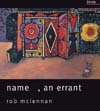rob mclennan, name , an errant

Reviewed by Melissa Flores-Bórquez
This is the right time of year for a new rob mclennan collection as one could easily mistake its arrival as another sign of spring, or of "groundhog daze". His poems are airy & light, not in the sense of being slight, but because they effortlessly weight-lift. Perhaps some of them are intentionally slight as well. More on that later. As one of the poems, "an aluminium can / rolls up the hill", has it
on a monday of late recycling
coke or pepsi, does it matter, caught up
w/ just enough
of air
a red swirl
makes a headway up, till a car passes
over, redirects
currents, back a few feet, before
it resumes, ahead
[...]
The poetry is also beautifully housed in Stride's nearly-square format, the short-line and one or two page-length pieces breathing easily. If this sounds like a blurb, then don't worry – yes, I'm the reviewer here and I did have a few reservations, though mostly I was delighted & my formal evening-reviewer-dress fell off, revealing that I was slouching around in Lainey Keogh knitwear after all. Onwards:
What's it all "abt"? Paul Celan is quoted as a preface:
The beams. They blow us together.
We bear the brightness, the pain and the name.
This quotation presents a working towards the name, or towards what can be named. Reading through, it's the word "name" itself which turns potato & sprouts out errant eyes in this book, and every errant reader can track mclennan's engagements with "the name", starting with the first poem "juliet is the name of a wound". It will be followed through jokes & scraps: The poem-forms are similar to collagraphs in varieties of method: collage, relief, stripped, layered, often all at once, printed.
It reads like poetry written with the pressure off, notes thrown out as "currency":
already a marker designed
to weed out counterfeit euros
fourteen days
a bill is a bill is a bill
in my pocket, three kinds
of money – american,
canadian & brit
& none of them useful
a stone stands out in a field, & what
do we know of it
pre-dating history
the import of this, & the export
of that
two days to get a guinness
that isnt extra cold
jan 14.02
dublin
It's so hyper-allusive except that doesn't matter. "a bill is a bill is a bill" is Stein written into Warhol, but that's obvious, so what's it really here for? It seems to be here so we can say, that's obvious, except it isn't, and a notebook will interest us more, now, than any "finished" poem. "currency" is from the series "threshold", which was 'written during a short reading tour of Ireland (with drinks after in England).' It's as if someone who'd read a lot of poetry & was rather good at writing the odd line himself had thrown you his notebook. Take a look at this, he says. For the stone in a field, see, in the first instance, John Ashbery (Girls On The Run):
[...] A louse
drags its lonely way up to the end of a porcupine quill, expires,
and can we have heard anything?
applied to a mute monument. The three kinds of money is perfectly put because mclennan seems to feel enriched, and indebted, as those of us who speak may well do, re: language. Poets, perhaps, more self-consciously so. He highlights this tendency in the notes: "poem beginning on half a line of a.gold" owes a line to an untitled Artie Gold poem (also known as "Poem Beginning on / Half a Line of Spicer's")'. It's the lack of pressure that's appealing.
I think mclennan has a philosophy of sand in this book, where sand is real, the granular: thy rope of sands, as George Herbert wrote, quoted by Borges, beginning The Book of Sand, "The line consists of an infinite number of points..." The story is also memorable because it says "the best place to hide a leaf is in the forest."
The pressure does subtly increase in scattered patches,
for doug jones
the poems will come, he says, once
the wood gets out
he captures the hard, thin
enterprise
& leans
by the backdoor
when the trees look like bones
a seasonal thing, what
pertains to the breath
not an accident of birth
once it can be seen, it can
finally be transcribed
reminding me of Ed Dorn's "The Rick of Green Wood". And my reservations? I didn't like the sequence "carnage / (poems from a book of days" which is a Sept 11 work coming off badly compared to the dissonances of event written out in Fanny Howe’s On The Ground. Here's one of the four, so see what you think:
( )
atlas shrugged, &
the world shook
at ground zero,
& the madness
who went down
instead of up
when tragedy occurs,
who can resist
the kindness
that holds
after evil
& the end
of that long
fourth dimension,
in the clouds
, street
Getting back to the sand, which, as one title says, is "the sand that is everywhere", it's the sand of ruins, which is why "ground zero" is here, and it's also a sand which closes in and seals/preserves, "you ask me for depth, but everything exists / on the surface of this earth, we have yet to learn / how to properly dig".
the more things change the more ( you
can go home
[£8.50, pbk, ISBN 1905024061, Published March 2006, Stride]